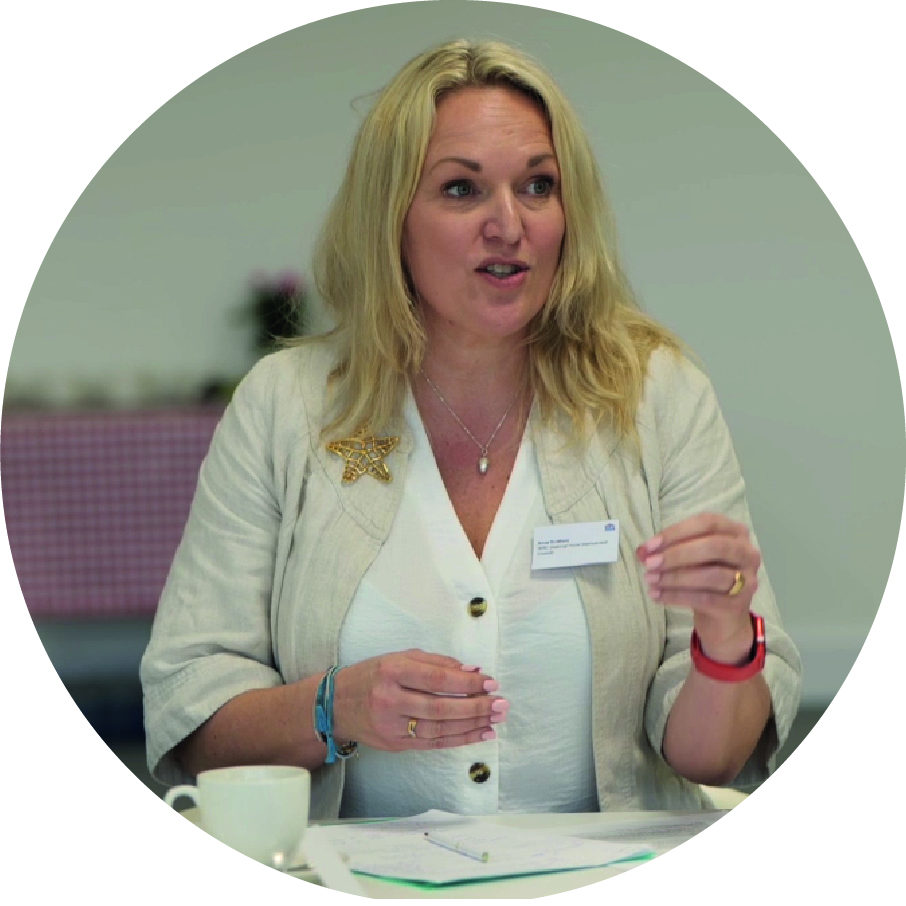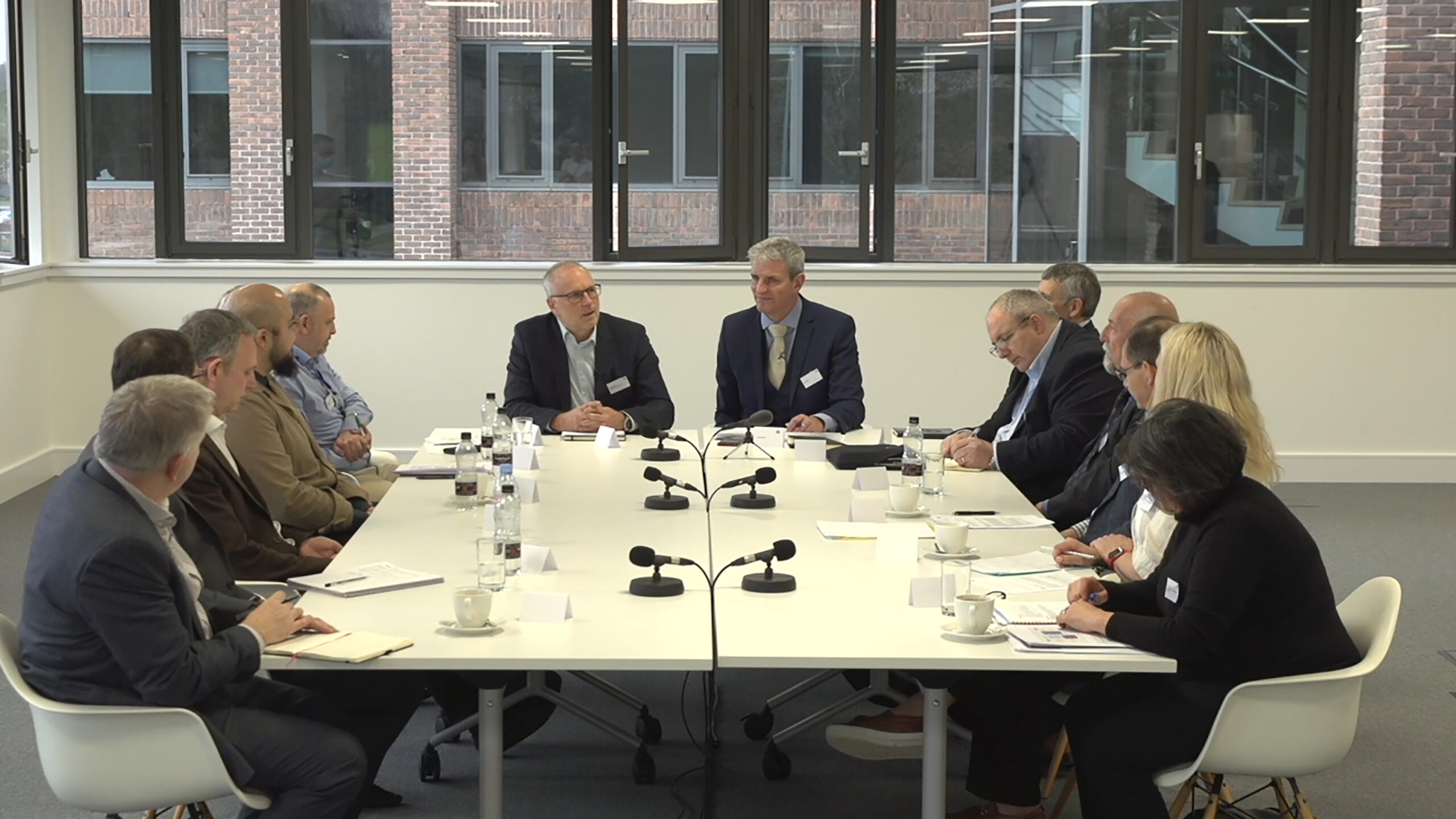If innovation is to take us forward how can the industry and wider world help? What can the construction industry do to meet government targets?
Can more be done to promote innovation in education?
Speaking at the BBA’s Round Table discussion, Jonathan Williams Xeini CEO, Simon Ayers TrustMark CEO, Ehab Sayed Biohm Founder and Director of Innovation and Anna Scothern National Home Improvement Council Chief Executive, shared their views.
It’s predicted that 80% of homes we will be using in 2050 are already standing. There’s a need to improve 17,000 homes per week to hit government targets. Is the UK giving enough support to innovation?
Anna Scothern, NHIC:
“The innovation needs to happen now to make things easy for householders, we make things complicated. Many homes now have smart-metering both for water and energy and wouldn’t it be wonderful if those smart meters were all wi-fi enabled, all connected to intelligence systems that learnt where they went, learnt your behaviour patterns and how you as a family used your energy because every home occupancy from next door so if your house learnt your occupancy for when things weren’t normal like if you had a leaking valve in your toilet cistern that’s wasting 10-20-30 litres of water a day which is millions of litres to the national grid for water. If you had it connected to your Alexa or Google device that alerted your smart watch or your phone to say your water usage isn’t quite correct, we think you might have a leak: here is a list of competent installers that are in your area who you can connect into. All of that is actually possible at the minute, the technology is all there, what isn’t there is the innovative thinking and the disruptor organisations and the open sharing of data to start pulling that together. “

Ehab Sayed, BIOHM:
“Innovation is absolutely critical but it does need to be carried out in a very quick manner to catch up with the change that’s required and the response that we need to demonstrate to the construction industry to the climate crisis as well. In terms of understanding how that innovation can take shape and how it can implement change real-time monitoring and understanding how the use of how things behave with sensors and smart meters and things like that, but also really important the intelligence systems. When we are working with a material or developing a new product for example, we would understand based on the chemical emissions of the living organisms that we work with – because we grow building insulations out of mushrooms – and we understand using the biochemical emissions and the organism signals that it’s giving us how that material is going to be responsive when it comes to testing and standards. That would be able to predict if it was built into the testing and the standard process and then monitored in real-time during its implementation, it’s absolutely transformational. It’s not new innovation or ground-breaking stuff, it’s combining some ancient, tribal technology that we’re working with, with some really advanced tech and machine learning and artificial intelligence.“

Jonathan Williams, Xerini:
“How the UK can help innovation from the ground up is universities and I think there’s a big role by becoming more cross-disciplined and for modules like machine-learning and artificial intelligence to be integrated with other degrees such as construction management and engineering where machine-learning and AI are tools that can be used as tools that can bring about change and innovation in other sectors and areas in other degrees. Universities have a big role to play and the UK has been very good at designing degrees that move away from the more traditional subjects and brining those together.”

Share This Story, Choose Your Platform!
Related Roundtables
If innovation is to take us forward how can the industry and wider world help? What can the construction industry do to meet government targets?
Can more be done to promote innovation in education?
Speaking at the BBA’s Round Table discussion, Jonathan Williams Xeini CEO, Simon Ayers TrustMark CEO, Ehab Sayed Biohm Founder and Director of Innovation and Anna Scothern National Home Improvement Council Chief Executive, shared their views.
It’s predicted that 80% of homes we will be using in 2050 are already standing. There’s a need to improve 17,000 homes per week to hit government targets. Is the UK giving enough support to innovation?
Anna Scothern, NHIC:
“The innovation needs to happen now to make things easy for householders, we make things complicated. Many homes now have smart-metering both for water and energy and wouldn’t it be wonderful if those smart meters were all wi-fi enabled, all connected to intelligence systems that learnt where they went, learnt your behaviour patterns and how you as a family used your energy because every home occupancy from next door so if your house learnt your occupancy for when things weren’t normal like if you had a leaking valve in your toilet cistern that’s wasting 10-20-30 litres of water a day which is millions of litres to the national grid for water. If you had it connected to your Alexa or Google device that alerted your smart watch or your phone to say your water usage isn’t quite correct, we think you might have a leak: here is a list of competent installers that are in your area who you can connect into. All of that is actually possible at the minute, the technology is all there, what isn’t there is the innovative thinking and the disruptor organisations and the open sharing of data to start pulling that together. “

Ehab Sayed, BIOHM:
“Innovation is absolutely critical but it does need to be carried out in a very quick manner to catch up with the change that’s required and the response that we need to demonstrate to the construction industry to the climate crisis as well. In terms of understanding how that innovation can take shape and how it can implement change real-time monitoring and understanding how the use of how things behave with sensors and smart meters and things like that, but also really important the intelligence systems. When we are working with a material or developing a new product for example, we would understand based on the chemical emissions of the living organisms that we work with – because we grow building insulations out of mushrooms – and we understand using the biochemical emissions and the organism signals that it’s giving us how that material is going to be responsive when it comes to testing and standards. That would be able to predict if it was built into the testing and the standard process and then monitored in real-time during its implementation, it’s absolutely transformational. It’s not new innovation or ground-breaking stuff, it’s combining some ancient, tribal technology that we’re working with, with some really advanced tech and machine learning and artificial intelligence.“

Jonathan Williams, Xerini:
“How the UK can help innovation from the ground up is universities and I think there’s a big role by becoming more cross-disciplined and for modules like machine-learning and artificial intelligence to be integrated with other degrees such as construction management and engineering where machine-learning and AI are tools that can be used as tools that can bring about change and innovation in other sectors and areas in other degrees. Universities have a big role to play and the UK has been very good at designing degrees that move away from the more traditional subjects and brining those together.”

Share This Story, Choose Your Platform!
Related Roundtables
Get in touch
Please complete the adjacent form and we will contact you as soon as possible.


